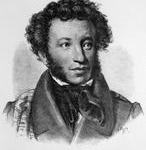Biography

Alexander Sergeyevich Pushkin was born in June 6, 1799 and died in February 10, 1837. He was a Russian writer and poet of the Romantic era who is considered by many to be the greatest Russian poet and the founder of modern Russian literature.
Pushkin pioneered the use of vernacular speech in his poems and plays, creating a style of storytelling—mixing drama, romance, and satire—associated with Russian literature ever since and greatly influencing later Russian writers. He also wrote historical fiction. His The Captain's Daughter provides insight into Russia during the reign of Catherine the Great.
Born in Moscow, Pushkin published his first poem at the age of fifteen. By the time he finished as part of the first graduating class of the prestigious Imperial Lyceum in Tsarskoe Selo near Saint Petersburg, the Russian literary scene recognized his talent widely. After finishing school, Pushkin installed himself in the vibrant and raucous intellectual youth culture of the capital, Saint Petersburg. In 1820 he published his first long poem, Ruslan and Lyudmila, amidst much controversy about its subject and style.
Pushkin gradually became committed to social reform and emerged as a spokesman for literary radicals; in the early 1820s he clashed with the government, which sent him into exile in southern Russia. While under the strict surveillance of government censors and unable to travel or publish at will, he wrote his most famous play, the drama Boris Godunov, but could not publish it until years later. His novel in verse, Eugene Onegin, was published serially from 1825 to 1832. Due to his political views and influence on generations of Russian rebels, Pushkin was portrayed by Bolsheviks as an opponent to bourgeois literature and culture and a predecessor of Soviet literature and poetry.
In the year 1831, during which Pushkin's growing lliterary influence was by then well known, he met one of Russia's other greatest early writers, Nikolai Gogol. After reading Gogol's 1831–2 volume of short stories Evenings on a Farm near Dikanka, Pushkin would support him critically and later in 1836 after starting his magazine, The Contemporary, would feature some of Gogol's most famous short stories. Later, Pushkin and his wife Natalya Goncharova, whom he married in 1831, became regulars of court society. When the Tsar gave Pushkin the lowest court title, the poet became enraged: he felt this occurred not only so that his wife, who had many admirers—including the Tsar himself—could properly attend court balls, but also to humiliate him. In 1837, falling into greater and greater debt amidst rumors that his wife had started conducting a scandalous affair, Pushkin challenged her alleged lover, his brother in-law Georges d'Anthès, to a duel which left both men injured, Pushkin mortally. He died two days later. His last home is a museum now.
In 1937, the town of Tsarskoe Selo was renamed Pushkin in his honour.
Last updated June 29, 2011



